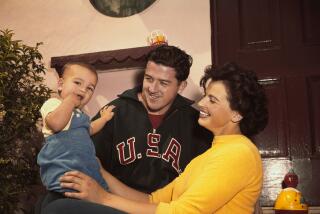Czech That, Mandlikova Is an Aussie
With regard to women’s tennis, we think of Steffi Graf, the most dependable German machine since the Benz, or Chris Evert, who someday soon will step out of bounds never to step back, or Martina Navratilova, who can still teach the teen-agers a thing or two, or even, more recently, Tracy Austin, whose recent auto accident once again reminds us of how good she once was, and how much greater she might have become with a little better luck.
The last time I gave Hana Mandlikova a second thought, though, was three years ago this summer, when we were both in Prague, Czechoslovakia, for the Federation Cup, the women’s answer to Davis. It was her first visit to that country in several years, and my first time ever. The difference was, it was her homecoming.
Navratilova, as usual--no, more than ever--was getting most of women’s tennis’ attention. Czechoslovakia was her home, too, but this was more than her welcome-home party. It was a drama.
See, Mandlikova had merely gone away, stayed away, become a woman of the world. But Navratilova had formally defected, had become an American, had pledged allegiance to a different flag.
Martina was not at all certain she would be welcomed back with open arms, even though she had turned into, without question, one of the greatest women athletes of all time. There was considerable concern about her return. Czech officials balked at first when asked if Navratilova could come. Then the Americans made an announcement that they were not coming without her. The Czechs relented.
So, she went. And a welcoming committee met her at the airport. And she traveled into the Prague countryside to visit her old hometown. And she played before cheering crowds. And understandable tears were wept.
And Hana Mandlikova?
She just played tennis and kept her mouth shut.
Until one day, I remember somebody coming up to me and asking: “Hear about Hana?”
“What about Hana?”
“She put on a leather outfit and grabbed some guy and went over to City Hall and got married.”
“She did?”
Turned out he was some Australian, somebody she had known for a while. Whether this was true love or a whim or a marriage of convenience, that was anybody’s guess, but it was certainly Mandlikova’s own private business--except in Czechoslovakia, where she was not exactly your average private citizen.
Six years earlier, as a teen-ager, she had won the Australian Open, been runner-up at the U.S. Open. A year later, she won the French, was second at Wimbledon. By 1985, she had led the Czechs to three straight Federation Cup championships, and had returned to her motherland to go after No. 4. She deserved a heroine’s welcome.
Only she was sort of overlooked. Her wedding made more news than her continuously excellent tennis. Hana got applause. Martina got cheers.
“That was much more an emotional time for Martina than for me. The only real emotional part for me was that I was getting married,” said Mandlikova, who writes about that experience and many others in a new book, “Hana,” not yet available in the States.
Having missed much of the last half-year with a hamstring injury, Mandlikova put the time to good use, finishing her book. Now she’s in Los Angeles--the city of hamstring injuries--to continue her comeback, playing in this week’s Virginia Slims event at Manhattan Beach.
“I’ll have to see how it goes,” she said. “With John McEnroe, it took him two years to get his game back.
“The important thing is to get your spirit back, your freshness, your eagerness. I’m prepared to lose a few matches as long as my heart is back in the game. If my heart is not involved, I can’t play tennis, I can’t make love, I can’t laugh, I can’t do anything. That’s the way I am. I’m very emotional. If I don’t have that, I’m half a person.”
She is divided in more ways than one. Mandlikova, too, changed her allegiance as well as her life. She not only married that Australian, you see. She became an Australian.
Mandlikova, now 27, owns homes in Australia and Belgium. She has a 42-foot yacht in Australia that she moors in a place called Sanctuary Cove, and that is exactly what it provides her, a sanctuary, a place to get away from it all. A year ago January, she gained Australian citizenship. She wants to represent Australia in the 1992 Olympics.
So, why did she leave Czechoslovakia?
“I didn’t ‘leave’ Czechoslovakia,” she said. “I just knew I was never going to live there.”
It might confuse others, but it makes perfect sense to her. Czechoslovakia is home. There are so many governmental restraints, travel restrictions, income garnishes, etc., that establishing a residence elsewhere becomes, for some, the wise thing to do. You’re a Czech, even if you are marching into a stadium with someone else’s Olympic team.
Of course, with all the changes for the better in Eastern bloc nations these days . . .
“I don’t see any changes,” Mandlikova said. “Not in Czechoslovakia, anyway. The people in other countries, like Hungary, are much more open to glasnost and perestroika than Czechoslovakia has been. The people in Czechoslovkia still can’t travel, and . . . oh, well. I really don’t like to give my political opinions in public.”
Writing a book was hard in that sense. When Martina wrote one, she opened a vein and bled all over the pages. Told everything she knew, everything she felt. Hana wants to hold something back, but without being boring.
Asked why she wrote one, she joked: “Because I didn’t have anything else to do.”
She kept a diary, though, during her playing days, and with its help described what life on the tour has been like. To some, Mandlikova’s four Grand Slams make her one of history’s best. To others, the depth of her talent has been diluted by her inconsistency, her unpredictability.
“I think the records speak for themselves,” she said. “If people think I am inconsistent and unpredictable, fine. But besides Martina and Evert and Graf, during the last eight years I’m the only one who has been winning Grand Slams. So I think I have had a pretty successful career.”
For now, her book is on sale only in Australia, Europe and Canada, but with luck it will soon be available in America, and with more luck there will be other chapters to follow. When she dedicates the book to a friend, the inscription reads: “I hope there will be reason someday to write another one.”
More to Read
Go beyond the scoreboard
Get the latest on L.A.'s teams in the daily Sports Report newsletter.
You may occasionally receive promotional content from the Los Angeles Times.






